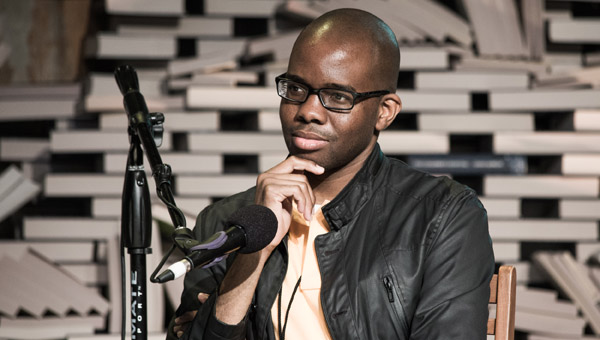The Caine Prize 2013: Tope Folarin with Chris Ouma, 10 September 2013, Fugard Theatre.
WANJIRU KOINANGE
Tope Folarin travelled back to Oxford, for the first time since he had been there for his postgraduate studies, to find himself seated next to Ben Okri, who was “plying [him] with champagne” at the Caine prize dinner. Here, it was announced that he had won the 2013 Caine prize for African Writing. “I knew that my life was going to change in a really fundamental way.”
Born and raised in Utah to Nigerian parents, Folarin was constantly on a quest to find himself as a black person living in the United States – a journey that led him to Morehouse College and eventually to the University of Cape Town. “I really came into my intellectual own when I was here in 2002, and it is tremendous to be back.” Eleven years later, Folarin speaks to Chris Ouma, English Professor at the University of Cape Town, about his award-winning story Miracle, and his journey to the Caine prize.
Miracle is a funny, awkward coming of age story of a young Nigerian man’s experience at a church in Texas at the spiritual and physical hands of a visiting pastor. The story deals beautifully with collective and individual faiths. A great success of the story is its ability to capture the sense of community born out of the disillusionment with failed American dreams. It is a deeply personal story, with strong similarities between the protagonist and Folarin. Despite being instructed by his father to leave his brain at the door when he walked into churches similar to the one described in the award winning story, Folarin explains that doubt is an essential part of who he is and it has become the “fire that purifies faith”.
Winning the Caine prize is a culmination of years of hard work, rejection and regimented writing. “I write the way I study,” he says about his process. It took Folarin a year to come up the first draft of the novel from which Miracle is excerpted. He explains that the first draft is something he is unable to trust: “It’s a mere representation of what the novel could be.” For this reason he spent two years revising the novel.
Like his writing, Folarin’s journey to the Caine prize is one that straddles the thin line between faith and doubt. His responses to Ouma’s questions are eloquent and measured, possessing the finesse of someone who has envisioned a moment several times before. As the talk drew to a close, the inevitable question of why Nigeria produces such a high standard of literature was posed from the audience, to which he carefully responded that he had grown up being told stories and being encouraged to read.
From the engaging conversation on the Open Book stage, I derived a few tips on achieving literary success:
- Work hard and work true. Ignore the expectations of those Teju Cole calls the “Authenticity Brigade”. Discard anything you may have read about the Caine prize story formula and write a story that is as interesting to you as possible.
- Become aggressive. Share your work as often as possible. Read your work at festivals and events, whether you’ve been invited to them or not.
- Adopt a “rapper mentality” as you embark on your “literary hustle”. Treat your story like a mix-tape. Always walk around with copies in your bag and slip them into the hands of other writers and people whose opinion you value.
- Find your local secret society of writers and do what you must to become a part of said society. This may not be as simple as it seems.
- Once you do get published, do not assume that your publishers will automatically submit your work to the Caine prize, so ask them to do so.
Wishing Tope Folarin all the best with his forthcoming novel.
 SLiPStellenbosch Literary Project
SLiPStellenbosch Literary Project 